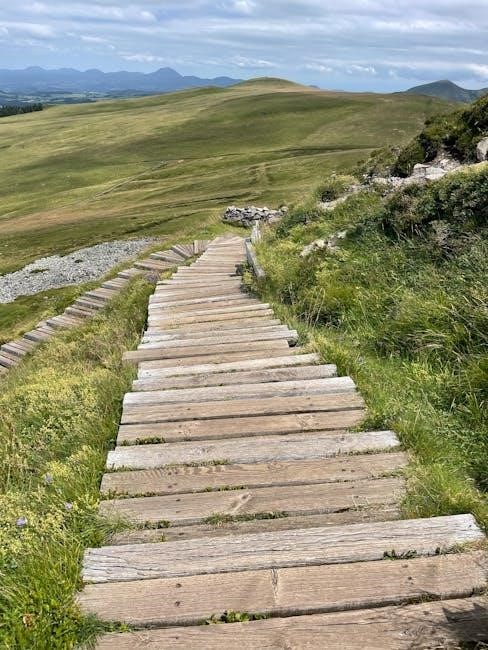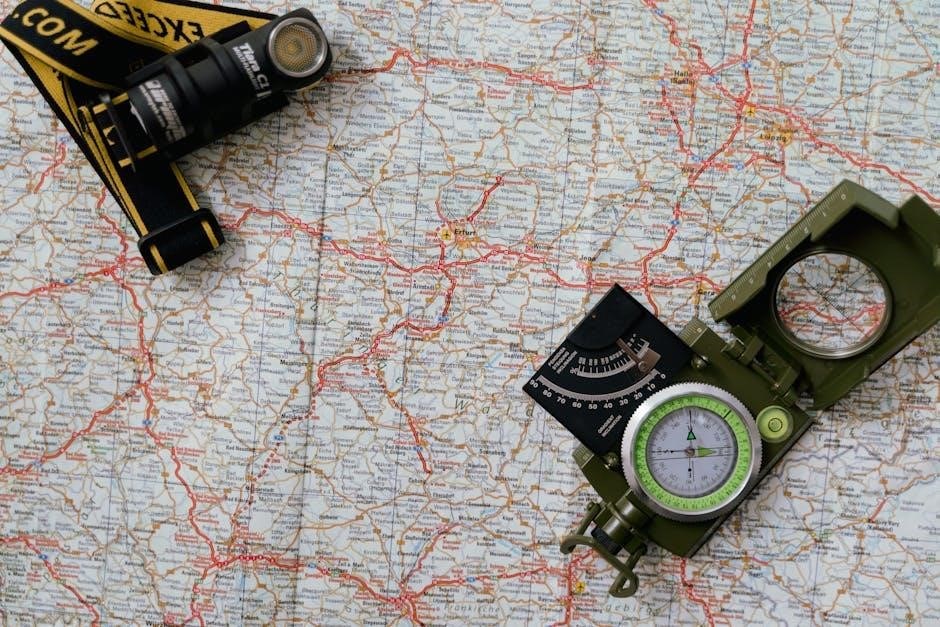Wilderness guides lead groups in outdoor activities, teaches survival skills and provides first aid, using skills obtained through training and certification programs, with courses focusing on practical skills and safety protocols always available online.
Definition and Role of a Wilderness Guide
A wilderness guide is an outdoor professional who leads groups of people in wilderness areas, providing guidance, education, and supervision. They are responsible for ensuring the safety and well-being of their clients, while also teaching them about the natural environment and promoting environmental awareness. Wilderness guides may work in a variety of settings, including national parks, forests, and wilderness areas, and may lead activities such as hiking, camping, and wildlife viewing. They must possess a deep understanding of the natural world, as well as strong leadership and communication skills. The role of a wilderness guide is multifaceted, requiring a combination of technical skills, knowledge of the natural environment, and interpersonal skills. Wilderness guides play a critical role in promoting conservation and environmental awareness, while also providing recreational opportunities for people to connect with nature. Overall, the definition and role of a wilderness guide is complex and varied, requiring a unique blend of skills and knowledge.

Essential Skills for Wilderness Guides
Wilderness guides require skills like navigation, risk management, and group leadership to ensure safe outdoor experiences always.
Cardiopulmonary Resuscitation and First Aid
Cardiopulmonary resuscitation, or CPR, is a crucial skill for wilderness guides to possess, as it enables them to respond to medical emergencies in remote areas. CPR involves chest compressions and artificial ventilation to maintain blood circulation and breathing. Wilderness guides must also be trained in first aid, which includes wound management, splinting, and treating altitude sickness. According to online courses, wilderness first aid certification is a requirement for many guide positions, and it involves learning how to assess and manage medical emergencies in the wilderness. Guides must be able to recognize the signs and symptoms of various medical conditions, such as heart attacks, strokes, and allergic reactions, and provide appropriate treatment. By possessing these skills, wilderness guides can help ensure the safety and well-being of their clients in emergency situations. This training is essential for guides to provide emergency care and prevent further injury or illness.
Outdoor Education and Naturalist Skills
Wilderness guides must possess strong outdoor education and naturalist skills to effectively lead groups and teach about the natural environment. This includes knowledge of ecology, botany, and wildlife biology, as well as the ability to identify plants and animals. Guides must also be able to interpret the natural environment and provide educational programs for clients. According to online courses, outdoor education involves teaching clients about outdoor skills, such as camping, hiking, and wildlife tracking. Naturalist skills involve understanding the complex relationships between living organisms and their environment. By possessing these skills, wilderness guides can provide clients with a deeper understanding and appreciation of the natural world. This knowledge is essential for guides to create engaging and educational experiences for clients. Online training programs are available to help guides develop these skills and become more effective outdoor educators and naturalists, providing a comprehensive understanding of the natural world.

Training and Certification for Wilderness Guides
Wilderness guides obtain certificates through training programs, with courses focusing on safety protocols and outdoor skills, available online, to ensure they are qualified to lead groups safely.
Wilderness Guide Training Programs
Wilderness guide training programs are designed to equip individuals with the necessary skills and knowledge to lead groups safely in the wilderness. These programs typically include a combination of classroom and field instruction, covering topics such as wilderness first aid, outdoor education, and naturalist skills. The training programs may also include hands-on experience in areas such as camping, hiking, and outdoor cooking. Many programs offer certification upon completion, which can be beneficial for those seeking employment as a wilderness guide. The training programs may be offered by colleges, universities, or private organizations, and can range in length from a few weeks to several months. Some programs may also offer specialized training in areas such as rock climbing, whitewater rafting, or wilderness survival. Overall, wilderness guide training programs provide individuals with the skills and knowledge needed to succeed in this rewarding and challenging career.
Certification and Competency
Certification is an essential aspect of becoming a wilderness guide, as it demonstrates a level of competency and expertise in the field. Many organizations offer certification programs for wilderness guides, which typically involve a combination of training and evaluation. The certification process may include a written exam, a practical skills assessment, and a background check. Once certified, wilderness guides must often complete continuing education requirements to maintain their certification. Certification can be beneficial for wilderness guides, as it can increase their job prospects and earning potential. It can also provide a level of assurance for clients and employers, who can be confident in the guide’s ability to provide a safe and enjoyable experience. Overall, certification is an important step in the career of a wilderness guide, and is often required by employers and regulatory agencies. Certification programs are designed to ensure that guides have the necessary skills and knowledge to lead groups safely.

Employment and Career Opportunities

Wilderness guides can find employment with tour companies, parks, and outdoor centers, leading groups and teaching skills, with many opportunities for advancement and specialization in the field of outdoor education always.
Job Prospects and Career Advancement
Wilderness guides can expect to find employment opportunities with tour companies, outdoor centers, and government agencies, leading groups and teaching outdoor skills. Many guides start out as assistants or interns and work their way up to lead guide positions. With experience, guides can specialize in specific areas, such as rock climbing or whitewater rafting, and increase their earning potential. Some guides may also choose to start their own outdoor adventure companies, offering customized trips and tours. According to industry reports, the demand for wilderness guides is expected to grow in the coming years, driven by increasing interest in outdoor recreation and adventure travel. As a result, job prospects for wilderness guides are expected to be favorable, with many opportunities for career advancement and professional development in the field of outdoor education and recreation. Guides can also pursue certification and training programs to enhance their skills and knowledge.



